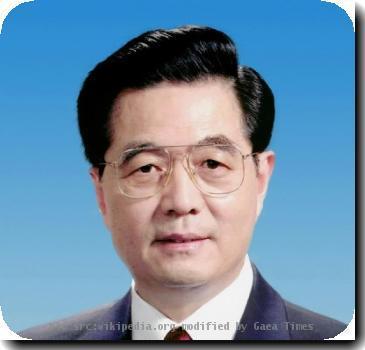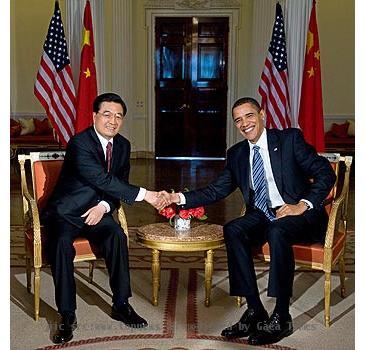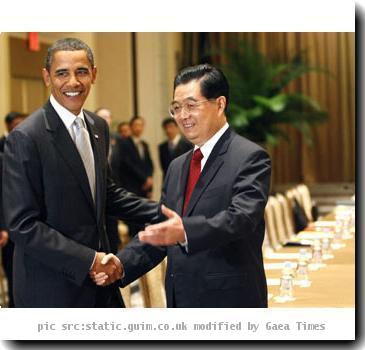Chinese President Hu flies to devastated earthquake zone as flow of aid increases
By Anita Chang, APSaturday, April 17, 2010
Chinese president Hu flies to Tibetan quake zone
JIEGU, China — Chinese President Hu Jintao cradled an injured Tibetan girl as she wept Sunday and promised speedy aid for the scores left homeless when a massive earthquake struck this remote, mountainous region, killing more than 1,700 people.
Hu cut short an official trip to South America to deal with the disaster in far west China’s Qinghai province, where Tibetan resentment over Han Chinese rule has occasionally boiled over into violence.
The president’s carefully scripted trip included visits with displaced families living in tents and rescue teams as they dug through debris. He also sat with injured survivors in a field hospital and promised the Communist Party and the government was doing everything they could to help the quake victims. Most of the affected were Tibetan.
“I guarantee the party and the government will help you build a new home and make sure your children can return to school as soon as possible,” Hu told a family living in a tent.
Footage on China Central Television also showed Hu grasping the hand of a monk as he pledged that every effort would be made to save anyone still trapped under the rubble. “As long as there is a ray of hope we will try 100 times harder to save lives,” he said.
Earlier Sunday, the official Xinhua News Agency reported that a 68-year-old man was pulled from the rubble four days after the quake hit Wednesday morning. It said the man, Dawa, only suffered broken ribs and had been trapped in a space that allowed him to move around.
At a field hospital set up on the grounds of a sports stadium, Hu sat on the bed of a Tibetan middle school student identified by China Central Television as Zhuoma, and held her as she wept. Her right arm was bandaged and supported by a sling.
“Rest assured, you will have a full recovery,” he told her. “Don’t worry. I know you are a good girl. Be strong. You will have a bright future. Grandpa will be thinking of you.”
Hu and Chinese Premier Wen Jiabao have both cultivated grandfatherly images in a bid to portray the leadership as putting people first.
The death toll rose Sunday by a few hundred to 1,706 with 256 still missing, the official Xinhua News Agency said, citing the rescue headquarters in Jiegu. It said 12,128 were injured, including 1,424 in serious condition.
Most of the survivors who were not evacuated to hospitals elsewhere are now living in tents and have basic food and clean water, Zou Ming, head of disaster relief at the Ministry of Civil Affairs, told a news conference in Beijing.
Still, Zou said, getting aid to the region, which is a 12-hour drive from the provincial capital, remains a problem.
Hundreds of the dead have been cremated. In a hillside ceremony Saturday, Buddhist monks in face masks set ablaze piles of blanket-wrapped bodies in a mass cremation, as necessity forced them to break with the local tradition of “sky burials” — leaving corpses on a platform to be devoured by vultures.
Rescue workers were still searching for survivors and bodies in schools. The quake destroyed more than a third of the school buildings in Jiegu and rendered the rest dangerous, according to the Qinghai provincial government. It said 103 students were killed and 684 students and teachers were injured, and at least 38 others were still missing.
Shattered schools remain a sensitive issue in China, where a devastating 2008 quake killed thousands of students, and school buildings and code enforcement were found to be inferior. But the quake this past week flattened schools and other buildings alike.
The first makeshift school started classes Saturday, with 60 elementary and middle school students singing the national anthem, Xinhua said. More classes were expected to resume Sunday.
In town, residents who had camped outdoors amid the debris and lived for days on water and instant noodles eagerly stuffed vegetables into plastic bags as a woman sold eggs and cans of soft drinks on the sidewalk, one of the first vendors to receive goods from out of town.
Taiwan’s Red Cross, meanwhile, sent a medical team with relief supplies and medicine, according to the government-owned Central News Agency. Taiwan and China split amid civil war in 1949, and while Beijing still claims the island as part of its territory, ties have warmed during the past two years.
The exiled Dalai Lama said Saturday he’d like to visit the quake site, though he has not returned to China since he fled Tibet in 1959 after a failed uprising against Chinese rule.
“To fulfill the wishes of many of the people there, I am eager to go there myself to offer them comfort,” the Tibetan spiritual leader said. China hasn’t commented but is unlikely to allow a visit after long accusing the Dalai Lama of fomenting separatism in Tibetan areas.
Associated Press writers Chi-Chi Zhang and Alexa Olesen in Beijing contributed to this report.
Tags: Asia, Beijing, China, East Asia, Emergency Management, Greater China, Hu Jintao, Jiegu, Regional Cooperation, Search And Rescue Efforts


